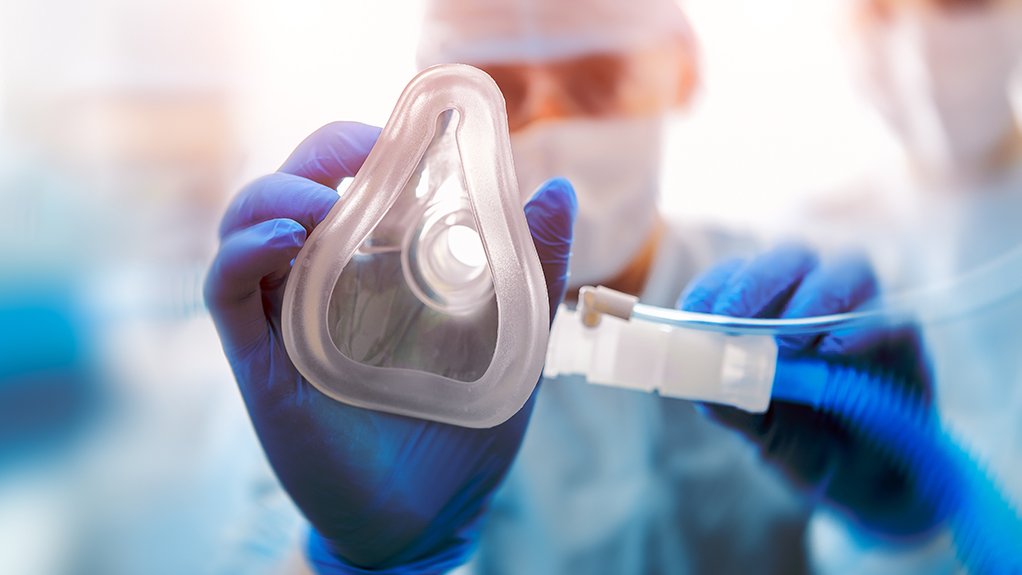Oxygen supply hampered by logistical issues, but there are adequate reserves, say suppliers
Industrial gases company Afrox has confirmed that it has adequate reserves of liquid oxygen in storage across South Africa and that it has supplied oxygen as required by public and private hospitals in all provinces at substantially higher than normal demand levels.
In response to questions from Engineering News, Afrox corporate and marketing communications manager Nolundi Rawana explained that, in understanding medical oxygen supply, the supply chain of converting the oxygen contained in the atmosphere into a pure liquid state and transporting it through various logistical means and delivery systems back into a gas and into the lungs of a patient, must be considered.
Owing to the large number of hospitalised patients requiring oxygen therapy, certain hospitals currently administer up to 400% more oxygen from bulk tanks and oxygen delivery systems to patients. This is more than the designed capacity at hospitals.
In response to this, Rawana notes that Afrox monitors hospital tank levels nationwide using telemetry, and schedules deliveries accordingly. In some instances, deliveries are now scheduled twice a day instead of twice a week.
The higher oxygen demand requires Afrox to have flexibly available bulk delivery tankers to transport the oxygen to hospitals, in response to which Afrox allocated a portion of its industrial tanker fleet to medical oxygen tankers to enable fast delivery to hospitals.
Afrox is also converting additional tankers, which are used to transport other liquid gases, to liquid oxygen tankers and will have additional distribution capacity available soon, Rawana adds.
However, hospitals with historical low oxygen demand, like those in rural South Africa, rely on oxygen cylinders which are ordered as required. Afrox has experienced unprecedented demand for cylinders owing to the rate of infection across the country, and has converted 8 000 industrial cylinders to medical oxygen cylinders in recent months.
Another 7 000 will be converted soon to bring the total to 15 000 cylinders. Afrox has confirmed that it will also cooperate with hospitals and the Department of Health to ensure fast turnaround times for cylinders, and to ensure empty cylinders are returned timeously to Afrox filling sites for refilling.
In considering the impact of reallocating 15 000 cylinders and 200 t/d of transport tanker capacity from industrial logistics to medical logistics, Rawana notes that Afrox cannot guarantee on-time, in-full deliveries to industrial customers during these unprecedented times, given the flexibility required in terms of the distribution assets and cylinders that must be maintained to facilitate fast delivery to hospitals.
Rawana adds that, since oxygen is a lifesaving therapy for infected patients, “Afrox made a moral and ethical decision to prioritise supply of medical oxygen while the pandemic persists”.
Afrox has issued a letter of force majeure to industrial consumers that explains that supply cannot be guaranteed and might become erratic or absent.
While the industrial gas supplier is unable to comment on how long the increased demand for medical oxygen will last, and how long the force majeure for industrial oxygen supply will remain in place, Rawana says the company will, as soon as it can, release the transportation assets and cylinders back to the industrial logistics chain in order to resume service to industrial customers as normal.
Considering that Afrox is responsible for only a portion of the medical oxygen supply chain, the company has urged hospitals and clinic administrators to ensure that medical oxygen cylinder orders are placed correctly, that they reflect demand and are ordered in time to ensure scheduled delivery.
“Hospitals also have a duty to ensure empty oxygen cylinders can be collected easily for rapid refilling and are not stored ad hoc within the hospital, which delays delivery schedule turnaround times and stocks of available oxygen-filled cylinders.”
While Afrox has and continues to fulfil every order received in line with the original pandemic action plan communicated and agreed in 2019 with the health authorities and hospitals, the company reiterates to Engineering News that it has in excess of 1 250 t of liquid oxygen in its back-up storage footprint alone in South Africa.
Fellow industrial and medical gases company Air Liquide has also confirmed that its teams are “fully mobilised to address the medical oxygen needs of the hospitals”.
Considering that the overall evolution in medical oxygen consumption from hospital customers is increasing very significantly, the company notes that, with the necessary re-allocation of its supply chain resources to serve hospitals in priority, it has also issued a notice of force majeure to its industrial clients to inform them of a possible and momentary interruption of deliveries.
Since the legal frame of the force majeure can be implemented when the group faces external events which have a major impact on its business and are beyond its control, the company has the objective to adjust usual deliveries in coordination with its clients.
Air Liquide says it will, in coordination with national health authorities, continue to monitor the gas supply situation closely as it evolves and is adapting measures accordingly to ensure optimal support to its customers.
Additionally, Manufacturing Circle executive director Philippa Rodseth highlights that while South Africa does have sufficient capacity to manufacture the required amount of medical-grade oxygen, “not all plants are built to manufacture [it]”.
While oxygen supply to hospitals is mainly through suppliers like Afrox and Air Liquide, Rodseth pinpoints logistical constraints as another potential bottleneck, considering that bulk liquefied oxygen requires specialised vehicles and highly-trained drivers.
“Given that we’re in Covid times, the drivers also have to follow protocols, as well as the customers, which [further] has an impact on the availability of staff if you have a Covid issue, [for example].”
This could be further exacerbated by the consideration that, where the oxygen is manufactured versus where it is needed, will change depending on where the regional demand sits.
A “fair amount” of collaboration is happening, to the extent that these deliveries take place as needed, Rodseth adds.
However, she laments that hospitals across South Africa have “different levels of infrastructure” as far as piped reticulation is concerned, making the distribution of oxygen to ventilators in a facility more challenging.
Despite this, Rodseth is positive that there has been an effort within the industry to assist and resolve issues as they occur.
“As far as I understand, there is a lot of work and effort being applied to make sure that oxygen is getting to where it needs to go, while ensuring that the wheels of industry keep turning to the extent that they currently are,” she avers.
Article Enquiry
Email Article
Save Article
Feedback
To advertise email advertising@creamermedia.co.za or click here
Press Office
Announcements
What's On
Subscribe to improve your user experience...
Option 1 (equivalent of R125 a month):
Receive a weekly copy of Creamer Media's Engineering News & Mining Weekly magazine
(print copy for those in South Africa and e-magazine for those outside of South Africa)
Receive daily email newsletters
Access to full search results
Access archive of magazine back copies
Access to Projects in Progress
Access to ONE Research Report of your choice in PDF format
Option 2 (equivalent of R375 a month):
All benefits from Option 1
PLUS
Access to Creamer Media's Research Channel Africa for ALL Research Reports, in PDF format, on various industrial and mining sectors
including Electricity; Water; Energy Transition; Hydrogen; Roads, Rail and Ports; Coal; Gold; Platinum; Battery Metals; etc.
Already a subscriber?
Forgotten your password?
Receive weekly copy of Creamer Media's Engineering News & Mining Weekly magazine (print copy for those in South Africa and e-magazine for those outside of South Africa)
➕
Recieve daily email newsletters
➕
Access to full search results
➕
Access archive of magazine back copies
➕
Access to Projects in Progress
➕
Access to ONE Research Report of your choice in PDF format
RESEARCH CHANNEL AFRICA
R4500 (equivalent of R375 a month)
SUBSCRIBEAll benefits from Option 1
➕
Access to Creamer Media's Research Channel Africa for ALL Research Reports on various industrial and mining sectors, in PDF format, including on:
Electricity
➕
Water
➕
Energy Transition
➕
Hydrogen
➕
Roads, Rail and Ports
➕
Coal
➕
Gold
➕
Platinum
➕
Battery Metals
➕
etc.
Receive all benefits from Option 1 or Option 2 delivered to numerous people at your company
➕
Multiple User names and Passwords for simultaneous log-ins
➕
Intranet integration access to all in your organisation





















